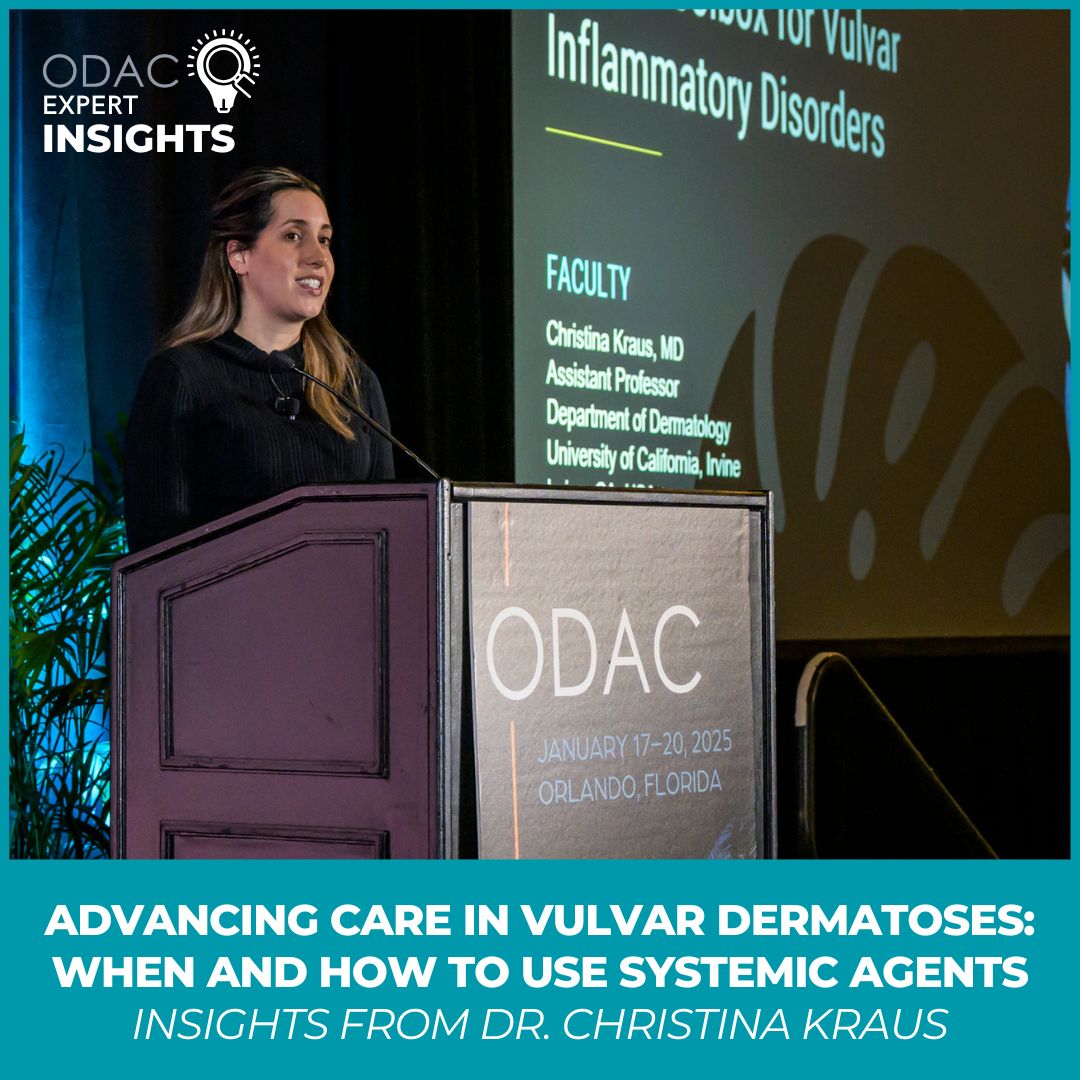Why Incorporate Systemic Agents?
Most cases of lichen sclerosus (LS), lichen planus (LP), and lichen simplex chronicus (LSC) respond to high-potency topical corticosteroids. Systemics may be considered for severe or refractory cases, particularly for prescarring conditions (LS, LP) requiring early, consistent intervention. Topical steroid use long-term may be limited by patient preference, side effects, or recalcitrant disease. Up to 43% of LP patients require systemic agents. Dermatologists have systemic tools used for other inflammatory dermatoses that can be considered for vulvar conditions that are not improving with standard care or would benefit from additional therapy .
General Guidelines for Considering Systemic Agents
-
- Severe or refractory vulvar disease.
-
- Chronic conditions requiring maintenance to prevent scarring and reduce skin cancer risk in LS.
-
- Disease extent: involvement beyond the vulva (e.g., scalp, nails in LP) may warrant systemic therapy.
-
- Symptom control: recalcitrant itch or pain despite appropriate topical treatment .
-
- Prevention of complications: scarring and functional impairment. Sexual function is important as well as minimizing pain and discomfort with activities of daily living (eg sitting, walking, etc.).
-
- Steroid-sparing options: recognizing that systemic steroids are not suitable for long-term management of chronic conditions
Vulvar Psoriasis as an Analogy
Severe vulvar psoriasis would likely prompt consideration of systemic agents, and severe LS/LP should be approached with a similar mindset if not improving adequately with first-line therapies
Literature on Systemic Agents in Vulvar LP and LS
There is limited evidence and lack of clear treatment guidelines for use of systemic agents in these conditions.
Survey Study of the International Society for the Study of Vulvovaginal Disease (ISSVD) 30-40% of respondents (gynecologists, dermatologists, urogynecologists) used systemic agents for vulvar disease at some point, more for LP than LS. Dermatologists were the highest prescribers of systemic therapies. Systemic agents used more frequently for severe disease and impacted quality of life. Systemic steroids were the most common agent for refractory cases, but acknowledged as not appropriate long-term. Half of respondents reported concern about potential side effects as their main hindrance to using systemic therapies for these conditions.
Systematic Review on Systemic Agents in Vulvar Lichen Sclerosus The most frequently reported therapies were oral retinoids (acitretin, isotretinoin).
Vulvar Lichen Sclerosus
Vulvar LS requires maintenance therapy to prevent scarring and malignancy. Steroid overuse and steroid phobia can complicate topical steroid use. Some cases remain recalcitrant even with optimal topical therapy, and this is the time to consider other tools in management. The morphology of the disease (hyperkeratotic, erosive, ulcerative) can also affect response to topicals. The most commonly reported systemic agents used for LS include oral retinoids (most common), methotrexate, mycophenolate mofetil, adalimumab. The choice of therapy depends on the patient’s comorbidities, severity, and risk-benefit discussion. Methotrexate and mycophenolate mofetil take time to improve disease control, therefore, proper counseling to patients on when to expect improvement is necessary to increase compliance. With any of these agents, it is necessary to discuss their off-label use, patient preferences, and the risks and benefits of each therapy, so patients are properly informed for shared decision-making to ensue.
Achieving Success with Systemic Agents
Assess disease severity, how much it is impacting their impact on quality of life, prior treatments, and comorbidities affecting their treatment choice. Address patient concerns and medical history to guide choice of treatment and shared decision making. Consider a multidisciplinary approach with rheumatology and/or gynecology depending on extent of genital or extragenital involvement and other medical co-morbidities. Monitor and reassess treatment periodically, aiming for the lowest effective dose to control disease.
Vulvar Lichen Planus
Erosive form of LP is a severe type, and most common on vulvovaginal skin and mucosa.
One of the goals in treatment of this disease is to prevent scarring. Evaluating for other cutaneous or mucosal involvement should be done when considering initiating a systemic agent. Overlap with lichen sclerosus can occur and should be considered if a patient with a diagnosis of LS is not improving with appropriate topical therapy.
Emerging Therapies
IL-23 inhibitors off-label for LP in patients with concomitant psoriasis or who have concerns about increased immunosuppression with other systemic agents can be considered (case series of their use by Gayle Fischer). JAK inhibitors off-label show early promising results for severe vulvovaginal LP (case reports and series),. Of course, have to consider comorbidities and potential side effects. There is a need for prospective longitudinal studies to further understand the efficacy and safety of these agents for inflammatory vulvar dermatoses.
Vulvar Lichen Simplex Chronicus (LSC)
There is no scarring risk, but LSC has significant impact on quality of life (itch, pain).
Evaluate and address irritants, allergens, and incontinence. Many patients will develop irritant dermatitis from use of various topicals, wet wipes, and/or urinary or even fecal incontinence. Extended patch testing can be useful in evaluating for any allergens that may be contributing to an allergic contact dermatitis. Systemic agents such as immunosuppressants, neuropathic agent (eg gabapentin)s, agents FDA-approved for atopic dermatitis (dupilumab) may be used to target itch and break the chronic itch-scratch cycle
Summary
-
- Systemic agents may be considered for refractory vulvar inflammatory dermatoses and it is critical to discuss off-label use of agents and engage in shared decision-making.
-
- Vulvovaginal LP often requires systemics, especially with extragenital involvement.
-
- Prioritize steroid-sparing systemic options over long-term use of systemic steroids.
-
- Consider having a lower threshold to discuss starting systemic agents in pre-scarring conditions (LS, LP) that are not responding to appropriate topical therapies.
-
- Emerging systemic therapies are exciting, but there is a need for rigorous prospective studies to evaluate the safety and efficacy of these agents in vulvar inflammatory skin conditions.
This information was presented by Dr. Christina Kraus during the 2025 ODAC Dermatology Conference. The above session highlights were written and compiled by Dr. Kala Hurst.

